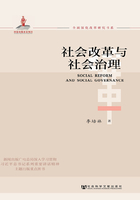
Abstract
After the first decade of the 21 st century, China has entered the new stage of comprehensively deepening reform and development. Since the reform and opening up in late 1970 s, tremendous changes have taken place in Chinese society. Reform and opening up unfold into two themes of great transformations for the past 35 years: the first theme is the transformation of the economic system from a highly-centralized planned economy to a socialist market economy; the other is the transformation of the social structure from an agricultural, rural, closed or half-closed traditional society to an industrial, urban, open and modern society, which is also known as the transformation of industrialization and urbanization. Economic reform is a powerful impetus to the development and transformation of social structure. However, compared with the transformation of the economic system, the transformation of social structure is more long-lasting, profound, and difficult. Experiences of China over the past 35 years firmly prove that reform and opening up is the only way to stick to the development of socialism with Chinese characteristics. The future of China will rely on the force of deepening reform. Along with the deepening reform, China has moved from the stage of reform and opening up focusing on the economic aspects to the new stage of comprehensive reform and opening up. Accelerating social reform becomes an important aspect of comprehensively promoting reform and opening up.
China's current situation is featured by sustained and rapid economic growth, general political stability, and unexpected social problems. Social problems come from the imbalance between economic development and social development, with the social development lagging behind the economic growth and the social reform lagging behind the economic reform.
Social reform is driven by rapid changes of social structures. At present, the changes hamper the sustainable development of economy and society, including high-speed urbanization, profound changes between supply and demand sides of labor forces, accelerating ageing society, tightened constrain of the natural resources and the environment, and the expanded domestic consumption. Those changes have been never seen before concerning its scale, speed, and depth, and they become the tremendous pressure for us to speed up the social reform.
Social reform is necessary for the improvement of people's lives. The principal contradiction in today's China is still the contradiction between people's growing material and cultural needs and the backward productive force. However, the manifestation of the contradiction will change in different development stages. At the beginning of the reform and opening up, the contradiction is characterized by the shortages of necessities. After the supply of commodities becomes balanced with or even exceeds the demand, the contradiction is manifested by the shortage of public goods and public services. With the economic growth and the people's material and cultural needs rising rapidly, quality of life, life satisfaction, health, happiness and justice become new demands. The growth of these new demands calls for the acceleration of social reform.
Social reform is pushed by the changes of interest structure. With the development of economic system and social structure, social mobility speeds up and interest structure undergoes profound changes. The income gaps have been widened between urban areas and rural areas, between different regions and between different strata. Different groups with their own stakes come into being in the interest structure along with the changes of class structure. The development of virtual economy make the pace of wealth's accumulation faster, and the income gap between labor and capital becomes widen. In some places, the relationship between cadres and ordinary people becomes tightened. All these changes bring about a more complicated interest structure and trigger kinds of social problems. Therefore changes of interest structure is speeding up social reform.
The core issue of economic reform is to handle the relationship between government and market, while the core issue of social reform and innovation of social governance systems is to deal with the relationship between government and society and between market and society. It should be made clear that which kinds of responsibilities of social governance shall be taken respectively by government, market and society, and which kinds of responsibilitiess shall be shared. With macroscopic readjustment and control from government and with the decisive role on resources allocation from market, we should make social forces play a better role.